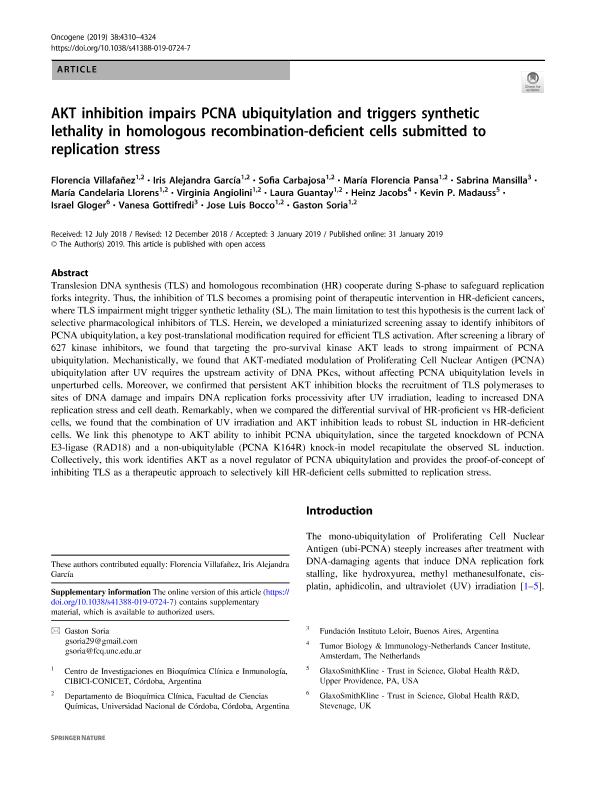Artículo
AKT inhibition impairs PCNA ubiquitylation and triggers synthetic lethality in homologous recombination-deficient cells submitted to replication stress
Villafañez, Florencia ; García, Iris Alejandra
; García, Iris Alejandra ; Carbajosa González, Sofía; Pansa, Maria Florencia
; Carbajosa González, Sofía; Pansa, Maria Florencia ; Mansilla, Sabrina Florencia
; Mansilla, Sabrina Florencia ; Llorens de Los Ríos, María Candelaria
; Llorens de Los Ríos, María Candelaria ; Angiolini, Virginia Andrea
; Angiolini, Virginia Andrea ; Guantay, Maria Laura
; Guantay, Maria Laura ; Jacobs, Heinz; Madauss, Kevin P.; Gloger, Israel; Gottifredi, Vanesa
; Jacobs, Heinz; Madauss, Kevin P.; Gloger, Israel; Gottifredi, Vanesa ; Bocco, Jose Luis
; Bocco, Jose Luis ; Soria, Ramiro Gaston
; Soria, Ramiro Gaston
 ; García, Iris Alejandra
; García, Iris Alejandra ; Carbajosa González, Sofía; Pansa, Maria Florencia
; Carbajosa González, Sofía; Pansa, Maria Florencia ; Mansilla, Sabrina Florencia
; Mansilla, Sabrina Florencia ; Llorens de Los Ríos, María Candelaria
; Llorens de Los Ríos, María Candelaria ; Angiolini, Virginia Andrea
; Angiolini, Virginia Andrea ; Guantay, Maria Laura
; Guantay, Maria Laura ; Jacobs, Heinz; Madauss, Kevin P.; Gloger, Israel; Gottifredi, Vanesa
; Jacobs, Heinz; Madauss, Kevin P.; Gloger, Israel; Gottifredi, Vanesa ; Bocco, Jose Luis
; Bocco, Jose Luis ; Soria, Ramiro Gaston
; Soria, Ramiro Gaston
Fecha de publicación:
05/2019
Editorial:
Nature Publishing Group
Revista:
Oncogene
ISSN:
0950-9232
e-ISSN:
1476-5594
Idioma:
Inglés
Tipo de recurso:
Artículo publicado
Clasificación temática:
Resumen
Translesion DNA synthesis (TLS) and homologous recombination (HR) cooperate during S-phase to safeguard replication forks integrity. Thus, the inhibition of TLS becomes a promising point of therapeutic intervention in HR-deficient cancers, where TLS impairment might trigger synthetic lethality (SL). The main limitation to test this hypothesis is the current lack of selective pharmacological inhibitors of TLS. Herein, we developed a miniaturized screening assay to identify inhibitors of PCNA ubiquitylation, a key post-translational modification required for efficient TLS activation. After screening a library of 627 kinase inhibitors, we found that targeting the pro-survival kinase AKT leads to strong impairment of PCNA ubiquitylation. Mechanistically, we found that AKT-mediated modulation of Proliferating Cell Nuclear Antigen (PCNA) ubiquitylation after UV requires the upstream activity of DNA PKcs, without affecting PCNA ubiquitylation levels in unperturbed cells. Moreover, we confirmed that persistent AKT inhibition blocks the recruitment of TLS polymerases to sites of DNA damage and impairs DNA replication forks processivity after UV irradiation, leading to increased DNA replication stress and cell death. Remarkably, when we compared the differential survival of HR-proficient vs HR-deficient cells, we found that the combination of UV irradiation and AKT inhibition leads to robust SL induction in HR-deficient cells. We link this phenotype to AKT ability to inhibit PCNA ubiquitylation, since the targeted knockdown of PCNA E3-ligase (RAD18) and a non-ubiquitylable (PCNA K164R) knock-in model recapitulate the observed SL induction. Collectively, this work identifies AKT as a novel regulator of PCNA ubiquitylation and provides the proof-of-concept of inhibiting TLS as a therapeutic approach to selectively kill HR-deficient cells submitted to replication stress.
Palabras clave:
AKT
,
PCNA
,
SYNTHETIC
,
LETHALITY
Archivos asociados
Licencia
Identificadores
Colecciones
Articulos(CCT - CORDOBA)
Articulos de CTRO.CIENTIFICO TECNOL.CONICET - CORDOBA
Articulos de CTRO.CIENTIFICO TECNOL.CONICET - CORDOBA
Articulos(CIBICI)
Articulos de CENTRO DE INV.EN BIOQUI.CLINICA E INMUNOLOGIA
Articulos de CENTRO DE INV.EN BIOQUI.CLINICA E INMUNOLOGIA
Articulos(IIBBA)
Articulos de INST.DE INVEST.BIOQUIMICAS DE BS.AS(I)
Articulos de INST.DE INVEST.BIOQUIMICAS DE BS.AS(I)
Citación
Villafañez, Florencia; García, Iris Alejandra; Carbajosa González, Sofía; Pansa, Maria Florencia; Mansilla, Sabrina Florencia; et al.; AKT inhibition impairs PCNA ubiquitylation and triggers synthetic lethality in homologous recombination-deficient cells submitted to replication stress; Nature Publishing Group; Oncogene; 38; 22; 5-2019; 4310-4324
Compartir
Altmétricas



